3. Promoting Efforts to Address Global Issues and Human Security
As globalization advances, the international community has been confronted with various challenges that cross national borders such as disparity and poverty, terrorism, refugees and displaced persons, infectious diseases, disaster risk reduction, climate change, and marine plastic litter. In 2020, the spread of COVID-19 has threatened the lives, livelihoods, and dignity of all people around the world, causing a crisis for human security. In order to resolve such transboundary global issues, it is necessary for the international community to move beyond the conventional concept of developed and developing countries and work together to address the issues (see Part I regarding Japan’s efforts against COVID-19 in 2020).
The SDGs, which are important in advancing such efforts, are 17 global goals to be achieved by 2030, agreed upon by all UN Member States at the UN Summit held in September 2015 as a successor of the Millennium Development Goals (MDGs). The SDGs represent a commitment by the entire international community including developed countries, and therefore could be described as a “compass” providing the direction toward the fundamental resolution of global issues that must be tackled by both developing and developed countries.
The Government of Japan established the SDGs Promotion Headquarters, with the Prime Minister as its head and all the Cabinet Ministers as its members, and has actively worked on achieving the SDGs both in Japan and abroad through the formulation of the SDGs Implementation Guiding Principles, which sets the direction for the promotion of the SDGs, and the SDGs Action Plan, which compiles specific policies. This section features Japan’s initiatives aimed at achieving the SDGs from the perspective of various fields including health, water and sanitation, education, gender, environment, and climate change (see also “ODA Topics 5” and “ODA Topics 8” for details).
Human Security
The SDGs present a vision of a prosperous and vibrant society where “no one is left behind.” This is in concurrence with the concept of “human security” that Japan has been promoting for many years, which seeks to build states and communities by protecting and empowering individuals so that they can live in dignity, free from fear and want. In the Development Cooperation Charter, human security is also positioned as the guiding principle that lies at the foundation of Japan’s development cooperation, and in order to promote human security, the Government of Japan undertakes various efforts both to (i) spread the concept and to (ii) put it into practice on the ground.
(i) Spreading the concept
After the unanimous adoption by the UN General Assembly of the resolution concerning common understanding of human security led by Japan in 2012, Japan has been continuing to spread the concept centered on the United Nations Human Security Unit. In February 2019, Japan took the opportunity of the 25th anniversary of the introduction of the concept of human security and held the High-level Event “Human Security at 25” with the UNDP, the United Nations Human Security Unit, and related countries at the UN Headquarters in New York.
(ii) Putting the concept into practice on the ground
Japan spearheaded the launch of the “UN Trust Fund for Human Security” in 1999 and has contributed approximately ¥47.8 billion in total by the end of FY2019. The trust fund has supported 257 UN projects to ensure human security in 99 countries and regions by the end of 2019.
OGATA Sadako Memorial Symposium
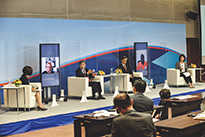
Panelists from both Japan and abroad discussing human security at the OGATA Sadako Memorial Symposium (Photo: JICA)
A memorial symposium commemorating Dr. OGATA Sadako, who spearheaded the refinement and practical implementation of the concept of human security at the front lines, was held by the JICA Ogata Sadako Research Institute for Peace and Development on November 2, 2020. The symposium looked back on Dr. Ogata’s achievements in the field of human security, with video messages sent in by UN Secretary-General Guterres and United Nations High Commissioner for Refugees (UNHCR) Grandi. A panel discussion was also held on how the international community should overcome the challenges faced in the COVID-19 and post-COVID-19 era under the concept of human security.
(1) Health and Medical Care
It is said that roughly at least half of the world’s population has no access to basic medical care Note 24. According to UNICEF, the World Health Organization (WHO), and others, more than 5.3 million children Note 25 under the age of five die annually due to infectious diseases, malnutrition, diarrhea, and other preventable causes, even today. Over 295,000 women Note 26 die during and following pregnancy and childbirth per year, primarily due to the lack of emergency obstetric care provided by skilled health professionals such as obstetricians, gynecologists, and/or midwives. Furthermore, in 2020, the spread of COVID-19 brought grave disruption to the lives and livelihoods of all people on the planet.
SDGs Goal 3 aims to “Ensure healthy lives and promote well-being for all at all ages.” In addition, in order to respond to various health issues, which differ across countries and regions, achieving “Universal Health Coverage (UHC)” is positioned as an important international goal to ensure that all people have access to basic health services at an affordable cost when needed.
●Japan’s Efforts
... Promotion of UHC (Japan’s Initiatives at International Conferences)
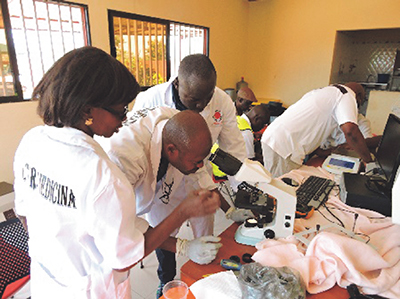
Former JICA training participants conducting maintenance on medical equipment in Angola (Photo: JICA)
Japan has placed importance on initiatives to improve healthcare that is directly linked to human security for a long time. Japan has been actively leading the promotion of UHC and the provision of basic health services under the “Japan brand” at international meetings including the G7, G20, TICAD, the UN General Assembly, and more.
Facing the global pandemic of COVID-19 in 2020, it was reconfirmed that improving preparedness and response against infectious diseases through efforts for achieving UHC is indispensable for sustainable economic growth and it is important to invest into UHC as part of a growth strategy.
At the G20 Osaka Summit in June 2019, under its Presidency, Japan discussed specific policies toward resolving issues such as achieving UHC, realizing a healthy and active ageing society, and health emergencies including antimicrobial resistance (AMR). In regard to the promotion of UHC, it was agreed in the Leaders’ Declaration to enhance human resources for health policy while working on it based on the contexts and priorities of each country. Furthermore, with regard to health financing, the leaders called for greater collaboration between health and finance authorities in accordance with the “G20 Shared Understanding on the Importance of UHC Financing in Developing Countries” confirmed at the first-ever G20 Joint Session of Finance and Health Ministers. In September 2020, under Saudi Arabia’s Presidency, the G20 Joint Finance and Health Ministers Meeting was held again following the 2019 session, and the joint statement reconfirmed the commitment to the “Shared Understanding” from the standpoint of preparedness and response against pandemics. At the G20 Riyadh Summit held in November 2020, Prime Minister Suga remarked that efforts toward UHC based on the principle of human security, including securing sustainable health financing, are indispensable. The G20 Riyadh Leaders’ Declaration confirmed the critical importance of well-functioning, value-based, inclusive, and resilient health systems toward achieving UHC, as well as the importance of sustainable health financing in developing countries.
At TICAD7 in August 2019, the Yokohama Declaration 2019 reaffirmed the commitment to further promotion of UHC in Africa based on the gains of TICAD VI and the G20 Osaka Summit. In addition, the Yokohama Plan of Actions 2019 specified the further promotion of UHC in Africa through effective policies, including strengthening health systems such as sustainable health financing through bolstering cooperation among health and finance authorities, strengthening capacity development, control of communicable and non-communicable diseases, maternal and child health, nutrition improvement, water and sanitation, and promoting cooperation with the private sector. Furthermore, Japan announced in “TICAD7: Japan’s contributions for Africa” that it would expand UHC, launch the Africa Health and Wellbeing Initiative, and host the Tokyo Nutrition for Growth Summit (see page Tokyo Nutrition for Growth Summit 2021 for details regarding the Tokyo Nutrition for Growth Summit).
At the UN, the first United Nations General Assembly High-Level Meeting on UHC was held in September 2019. During the meeting, then Prime Minister Abe took the stage at the closing ceremony as the only leader of a member state, introduced Japan’s contributions to promote other countries’ efforts toward achieving UHC at the G20 Osaka Summit and TICAD7 in 2019, and emphasized the importance of promoting a cross-sectoral approach, combining health development with nutrition, water, and sanitation, and strengthening health financing. At the meeting, UHC Political Declaration was endorsed, which affirmed goals, such as providing basic health services to all people and eliminating impoverishment due to health-related expenses by 2030.
On September 26, 2020, Prime Minister Suga gave his first address at the General Debate of the UN General Assembly since taking office, where he touched upon Japan’s international health policy including measures against COVID-19 at the beginning. In his address, he pointed out that the spread of the disease is a crisis for human security and, in advancing countermeasures, it is essential to set the goal of “leaving no one’s health behind” and to achieve UHC.
In addition, he announced that Japan would proactively lead international efforts with a focus on the areas of (i) fully supporting the development of therapeutics, vaccines, and diagnostics and ensuring fair and equitable access for all including those in developing countries, (ii) supporting the strengthening of each country’s health and medical systems including through building hospitals, providing equipment, and supporting human resources development, and (iii) taking measures to ensure health security including improvement in conditions for water, sanitation and hygiene, nutrition, and other environmental factors.
Among these areas, vaccinations are one of the most cost-effective investments, estimated to save the lives of approximately two to three million people each year. To promote these efforts, at Gavi, the Vaccine Alliance’s* third donor pledging conference (the “Global Vaccine Summit”) on June 4, 2020, Japan announced that it would provide contributions of $300 million for the time being (see the Part I “Japanese Personnel Playing Active Roles in International Organizations across the World” regarding the Japanese staff working at Gavi). Moreover, through bilateral assistance, Japan contributes to increased vaccination rates by providing support including vaccine production and management as well as operations and maintenance for cold chains Note 27.
Furthermore, on October 8, 2020, Foreign Minister Motegi co-hosted the Ministerial Meeting of Group of Friends of UHC with the foreign ministers of Thailand and Georgia who co-chair the group, which aims to further promote awareness of UHC in the international community. The meeting was attended by UN Secretary-General Guterres, the foreign ministers of Thailand, Georgia, Kenya, and Senegal, the health ministers of Ghana, Uruguay, and India, WHO Director-General Tedros, UNICEF Executive Director Fore, Gavi, the Vaccine Alliance CEO Berkley, and Coalition for Epidemic Preparedness Innovations (CEPI) CEO Hatchett.
Foreign Minister Motegi gave a speech at the beginning in which he explained the specific efforts Japan was spearheading and stated that Japan remains committed to realizing UHC together with the international community, in line with Prime Minister Suga’s address at the General Debate of the UN General Assembly. Specifically, he announced that out of the $300 million of assistance pledged at the Global Vaccine Summit, Japan would contribute over $130 million to the Advance Market Commitment (AMC)* of the COVID-19 Vaccine Global Access Facility (COVAX Facility) in order to enable lower income countries to reinforce equitable access to vaccines. Related countries and organizations extended their appreciation to Japan's leading role and initiatives toward achieving UHC including this contribution (see Part 1 “E. Global Efforts for Vaccine Development and Distribution” regarding global efforts for vaccine development and distribution).
Additionally, on December 4, 2020, the Special Session of the UN General Assembly in response to the COVID-19 Pandemic was held with the aim to evaluate the international community’s response to COVID-19 and its impact on social and economic activity and to further strengthen global cooperation for the future response. In a video message, Prime Minister Suga stated the importance of aiming at “leaving no one’s health behind” in achieving UHC, guided by the principle of human security, and that Japan would promote efforts to overcome the crisis of the pandemic, strengthen health and medical systems, and generate an environment that is resilient to infectious diseases.
... Promotion of UHC (Japan’s Specific Contributions)
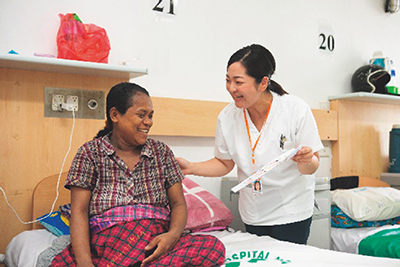
A Japan Overseas Cooperation Volunteer (JOCV) explaining hospital infection prevention at a national hospital in Timor-Leste (Photo: JICA)
Under the “Basic Design for Peace and Health” enacted in 2015, the Government of Japan provides assistance to achieve UHC that aims to “leave no one behind,” utilizing its experience, technology, and expertise.
Primary healthcare* services under UHC comprise all services ranging from nutritional improvement (see “(8) Food Security and Nutrition”), vaccination, maternal and child health, sexual and reproductive health, infectious disease control, non-communicable disease (NCD) control, and comprehensive community care and long-term care for the elderly.
With regard to maternal and child health in developing countries, there are still significant challenges, despite improvements such as a reduction in the under-five mortality rate and maternal mortality rate, as well as an increase in births attended by skilled health professionals. Japan aims to strengthen sustainable health systems by providing comprehensive, continuous maternal and child care and strengthening the ownership and capabilities of developing countries. In pursuit of these aims, Japan has been supporting many countries including Ghana, Senegal, Bangladesh, Cambodia, and Laos. Through this assistance, Japan contributes to making necessary services accessible to all women at every stage of pregnancy (including that of adolescence and family planning), as well as for newborns and infants.
Furthermore, Japan is implementing activities utilizing the Maternal and Child Health (MCH) Handbook as a means of improving maternal and child health, based on its experience and expertise. The MCH Handbook can contribute to the Continuum of Care (CoC) from pregnancy, childbirth, the post-partum period Note 28, the neonatal period, infancy, and to early childhood. It also enables mothers to acquire knowledge about health, which in turn raises awareness and encourages behavior modification. To give an example of the concrete assistance, the MCH Handbook is being widely used throughout the country in Indonesia as a result of Japan’s cooperation. Moreover, among the countries promoting the use of the MCH Handbook, including Indonesia, Thailand, the Philippines, Laos, Cambodia, and Kenya, there have been sessions to share their experiences and learn from each other. Furthermore, these countries hold exchanges of opinions with Afghanistan and Tajikistan, which are implementing trial use of the MCH Handbook. In addition, efforts are also being conducted for the utilization of the MCH Handbook in other countries in Africa, including Ghana.
Japanese NGOs have been working in health and medical care using the Grant Assistance for Japanese NGO Projects scheme. For example, in Banke District, Nepal, where there is a great need to improve the healthcare environment for newborns and infants, ADRA Japan, a non-profit organization, has been implementing a project to rehabilitate healthcare facilities and provide medical equipment and supplies, while providing training aimed at raising awareness of health-related knowledge among the local residents, district officials, and medical personnel (see also “Project Introduction Column”).
In addition, Japan works with other development partners, such as the United Nations Population Fund (UNFPA), the International Planned Parenthood Federation (IPPF), and the World Bank, to promote maternal and child health that includes sexual and reproductive health services, and thereby improving the health of a greater number of women and children in aid recipient countries (see also “Project Introduction Column”).
Furthermore, Japan supports policy reforms toward achieving UHC and is also engaged in its promotion from a comprehensive, medium to long-term standpoint, such as by providing health sector policy loans for the achievement of UHC in Senegal and Kenya.
Timor-Leste
Project for Strengthening Primary Health Care Service Delivery through Community Participation (Phase 1 and 2)
Grant Assistance for Japanese NGO Projects (February 2019 – (ongoing))
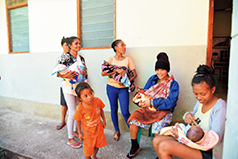
Transporting medicines and vaccines to coastal villages using the small boat provided by the project (Photo: SHARE)
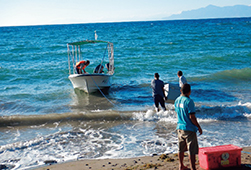
Transporting medicines and vaccines to coastal villages using the small boat provided by the project (Photo: SHARE)
“I lost my first child a week after the birth and had a miscarriage with my second baby. It takes me over one hour to walk to the nearest medical facility, and I received prenatal care only once or twice.” This is the reality faced by most mothers and their children living in remote areas of Dili, the capital of Timor-Leste. In Dili, there are areas where access to roads, electricity, and primary healthcare services is still limited, putting both the vaccination rate and prenatal care rate at 50% or below, lower than the country’s average.
In order to improve this situation, Services for the Health in Asian and African Regions (SHARE), a Japanese NGO involved in international cooperation, constructed a public health clinic (health post)* and provided a small boat to deliver health and medical services to the people living in Metinaro administrative post, Dili, as well as Atauro Island, a remote island off the coast of the capital. Moreover, SHARE has been working to improve the capacity of local medical personnel and provide health education to local residents.
Thanks to this project, a total of approximately 1,200 people were able to receive healthcare between November 2019 and October 2020 in Manleuana village, Metinaro administrative post, where there is a population of 2,000 people and no doctor. In addition, on Atauro Island, health center personnel and local residents have been working to conduct mobile health checkups using the small boat provided by this project.
As a result, the overall vaccination rate in Dili improved by nearly 20%. Even in 2020, when the domestic consultation rate declined due to the COVID-19 pandemic, the health center continued to provide healthcare services through a trial-and-error process. Consequently, 2,324 people in the targeted communities have been vaccinated by August, which is 380 more people than the same period in the previous year.
Furthermore, through this project, a total of 97 people, including doctors, midwives, and healthcare volunteers, have received training aimed at improving their healthcare skills and knowledge. They will continue to apply the skills and knowledge that they have acquired in providing healthcare services and health education for local residents.
*In Timor-Leste, there is one health bureau for each of the 13 municipalities to oversee municipality healthcare under the Ministry of Health, and health centers and public health clinics (health posts) have been established in the districts.
... Strengthening Response Capacity, Prevention Measures, and Preparation for Public Health Emergencies
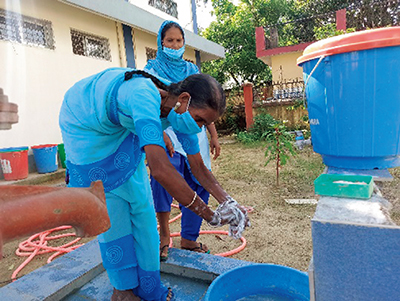
Community health volunteers learning about handwashing methods at a health post in Banke District, Nepal (Photo: ADRA Japan)
In a globalized world, as infectious diseases easily spread beyond national borders and have a serious impact on the entire international community, it is important to put in place countermeasures for emerging and re-emerging infectious diseases Note 29. The Ebola outbreak in the countries of West Africa from 2014 to 2015 took many lives and resulted in the spread of infection to neighboring countries and the secondary infection of medical personnel, and thus became a major humanitarian, economic, and political challenge for the international community. Moreover, Ebola has been spreading once again in the Democratic Republic of the Congo since August 2018. In addition to financial assistance, Japan has seamlessly provided a variety of assistance to such affected countries and international organizations, including the dispatch of experts and provision of emergency relief goods. Furthermore, Japan is supporting the efforts to overcome the Ebola crisis through public-private cooperation, such as providing medicine and rapid test kits utilizing the technology of Japanese private companies (see “Master Techniques from Japan to the World” regarding SATREP’s support in the field of infectious disease in Africa).
From the point of view that building a sustainable and resilient health system is crucial to controlling infectious diseases, Japan has been strengthening the capacity of prevention, preparedness, and response to public health crises, particularly in African countries, and aims to realize an Africa in which all people have access to health services. To that end, Japan is swiftly implementing assistance that contributes to their social and economic recovery, including assistance for the health sector such as capacity building of medical staff and improvement of medical facilities, infrastructure development, and food security enhancement.
Moreover, Japan leads discussions in international fora such as the G7 and TICAD on the establishment of the Global Health Architecture, a framework of the international community for responding to these health crises. On the occasion of the G7 Ise-Shima Summit in 2016, discussing the WHO’s responses to public health emergencies, then Prime Minister Abe announced contributions of $50 million to the WHO Health Emergencies Programme*, the Contingency Fund for Emergencies (CFE)*, and others. These contributions are being used to respond to the outbreak of the Ebola virus disease that has continued in the Democratic Republic of the Congo since 2018 as well as the COVID-19 pandemic in 2020, contributing to the response against health emergencies. Furthermore, utilizing funds such as the Health Emergency Preparedness and Response Multi-Donor Trust Fund (HEPRTF) launched in cooperation between Japan and the World Bank Group in June 2020, Japan is providing assistance for strengthening capacities in preparedness and responses against infectious diseases in developing countries.
... Responding to Antimicrobial Resistance (AMR)
Antimicrobial resistance (AMR) Note 30 is a serious threat to public health, and in recent years, more and more countermeasures against AMR have been taken. In order to advance measures against AMR, Japan is promoting the “One Health Approach” for those who are engaged in the field of sanitation concerning people, animals, and the environment to work together on efforts. In the G20 Osaka Leaders’ Declaration in 2019 as well, it was agreed to accelerate efforts based on the “One Health Approach.” At the G20 Health Ministers’ Meeting held in Okayama in October 2019, the Ministers adopted the Okayama Declaration of the G20 Health Ministers, which mentioned the importance of continuing AMR measures based on the same approach. In addition, in the same month, Japan announced that it would contribute approximately ¥1 billion to the Global Antibiotic Research & Development Partnership (GARDP), which promotes research and development for new antibiotics and diagnosis development, and is exerting leadership for AMR measures including through participation in the AMR leadership group. In 2020, Japan contributed approximately ¥200 million to GARDP.
Nigeria
(1) Polio Eradication Project, (2) Project for Eradication of Poliomyelitis/Project for Infectious Diseases Prevention for Children
(1) ODA Loan, (2) Grant Aid ((1) May 2014 – (ongoing), (2) 2000 - 2013*1)
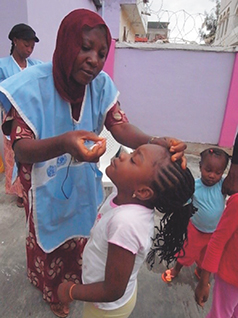
Administering an oral polio vaccine to a child (Photo: JICA)
Nigeria used to be the last wild poliovirus endemic country in Africa and one of the three countries*2 in the world where the cases of wild polio were still being identified. As of 2012, Nigeria accounted for approximately half of the world’s polio cases.
In response to this situation, Japan has provided Nigeria with a wide range of support, from procurement of vaccines to development of human resources, in order to strengthen measures for polio eradication.
For example, through the grant aid “Project for Eradication of Poliomyelitis” and the “Project for Infectious Diseases Prevention for Children” through UNICEF, in addition to procurement of vaccines, Japan worked on the development of cold chains*3, including solar-powered refrigerators that enable the transportation and storage of vaccines to remote areas. Japan also provided assistance to improve the testing technology and related equipment of national polio laboratories in Nigeria and support for human resources development for researchers of polio through JICA training.
Furthermore, in 2014, Japan implemented an ODA loan project to procure polio vaccines. In Nigeria, the vaccines procured through the ODA loan were used to conduct a thorough immunization campaign to eradicate polio. This ODA loan adopted an innovative financing approach (loan conversion mechanism)*4, under which the Bill & Melinda Gates Foundation agreed to repay the loan debt in place of the Nigerian government on the condition that the predetermined goals were successfully achieved.
Thanks to the contributions by Japan and the international community, Africa was declared polio-free on August 25, 2020*5. Mr. ISONO Mitsuo, a JICA senior advisor who has been engaged in the fight against infectious diseases in Nigeria for many years, shared the following thoughts on the polio-free declaration.
“Nigeria is a vast country with many hard-to-reach areas and complex security challenges. I believe that the government’s leadership, as well as the efforts of many staff who have been engaged in the most difficult countermeasures against polio on the front lines, contributed to the eradication of polio.”
Japan will continue to contribute to the prevention and control of the spread of infectious diseases in Africa together with the international community.
*1 Grant aid was provided every year from 2000 to 2013.。
*2 The three countries are Nigeria, Afghanistan, and Pakistan.
*3 See Note 27.
*4 In December 2017, the Bill & Melinda Gates Foundation took over the ODA loan obligations after it was recognized that the vaccination rate and other project targets that had been set in advance were achieved.
*5 WHO has certified that Nigeria has zero cases of the wild polio (polio-free) for the past three years.
... The Three Major Infectious Diseases (HIV/AIDS, Tuberculosis, and Malaria)
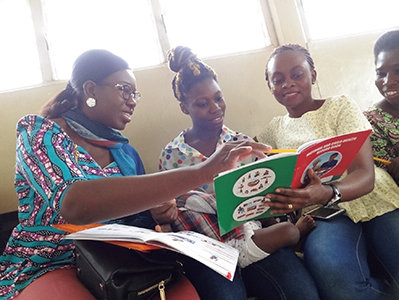
Mothers receiving an explanation on newly created MCH Handbooks under the technical cooperation “Project for Improving Continuum of Care for Mothers and Children through the Introduction of Combined MCH Record Book” in Ghana (Photo: JICA)
SDGs target 3.3 sets out to end epidemics of the three major infectious diseases by 2030. Japan has been providing support for measures against the three major infectious diseases and strengthening health systems through the “Global Fund to Fight AIDS, Tuberculosis and Malaria (the Global Fund),” an organization whose establishment was agreed upon at the G8 Kyushu-Okinawa Summit held in 2000. Since its establishment in 2002 to the end of December 2019, Japan has contributed approximately $3.46 billion to the Global Fund. Furthermore, Japan provides supplemental bilateral aid to the developing countries receiving support from the Global Fund in order to ensure that measures against these three major infectious diseases are implemented effectively in those countries. Japan also strives to strengthen mutual cooperation on enhancing health systems, community empowerment, and policies for maternal and child health in those countries.
Japan is providing assistance such as spreading knowledge to prevent new infections and promoting awareness raising, testing, and counseling as bilateral assistance for HIV/AIDS countermeasures. JOCVs for Infectious Disease and HIV/AIDS Control are vigorously engaging in activities especially in Africa. These activities include spreading knowledge on prevention and promoting understanding of it among as many people as possible and providing care and support for people infected by HIV/AIDS.
With regard to tuberculosis, based on the “Stop TB Japan Action Plan”* announced in 2008, Japan is engaged in reducing the annual number of deaths from tuberculosis in developing countries, particularly in Asia and Africa. These efforts aim to achieve a 10% reduction of the number of deaths from tuberculosis worldwide (160,000 people, based on 2006 figures) by making use of Japan’s own experience and technology to take measures against tuberculosis through a public-private partnership.
In addition to these efforts, with regard to malaria, one of the major causes of infant mortality, Japan provides assistance for anti-malaria countermeasures such as initiatives through the strengthening of local communities in Myanmar and Solomon. Moreover, Japan also provides assistance in cooperation with the WHO.
... Polio
Although polio is on the brink of being eradicated, Japan has been working mainly in cooperation with UNICEF to provide support for its complete eradication with a focus on countries where cases of infection are still being identified (countries where wild strains of polio are constantly present). In August 2020, Nigeria, the last country with a constant wild polio presence in Africa, was recognized to have had no cases of wild strains of polio for the past three years, and Africa was declared to be polio-free. Japan has continuously supported a wide range of polio countermeasures for Nigeria from vaccine procurement to human resources development (see also Project Introduction Column regarding efforts toward the eradication of polio in Nigeria).
Furthermore, in Pakistan, Japan has provided grant aid amounting to more than ¥11 billion in coordination with UNICEF since 1996 and provided an ODA loan of approximately ¥6.3 billion in 2016. Under the polio-related ODA loan, a new approach (loan conversion) was adopted where the private sector Bill & Melinda Gates Foundation will pay the debt owed by the Government of Pakistan when certain targets are achieved.
... Neglected Tropical Diseases (NTDs)
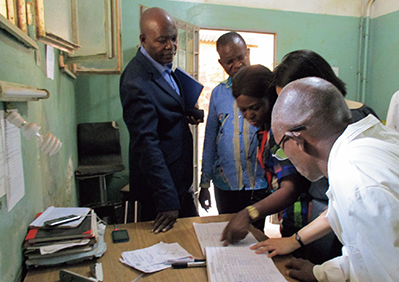
A survey of the current situation underway in the “Project for Reinforcement of Infectious Diseases Epidemiological Surveillance System” in the Democratic Republic of the Congo (Photo: JICA)
Parasitic and bacterial infections, such as Chagas disease, Filariasis, and Schistosomiasis, are known as “neglected tropical diseases (NTDs),” and have infected more than 1 billion people worldwide, causing major socio-economic losses to developing countries. Since infectious diseases can have an impact beyond national borders, the international community must work as one to combat them. Thus, Japan also cooperates closely with all the relevant countries and international organizations on countermeasures against NTDs.
Since 2000, Japan has provided support against Filariasis for Pacific island countries through technical cooperation. This long-term support has proved successful, with eight of 14 Oceanian countries (Cook, Marshall, Nauru, Niue, Palau, Solomon, Tonga, and Vanuatu) having eliminated Filariasis. Continuing from this, in October 2019, the WHO declared Kiribati to have eliminated lymphatic Filariasis. Through the dispatch of experts and other means, Japan will continue to support plans for the elimination of Filariasis in Pacific island countries.
Glossary
- *Gavi, the Vaccine Alliance
- Gavi, the Vaccine Alliance is a public-private partnership which was established in 2000 with the aim of saving children’s lives and protecting people’s health by improving immunization rates in developing countries. Governments of donor countries and developing countries, relevant international organizations, the pharmaceutical industry, private foundations, and civil society participate in this partnership. Since its establishment, it is said to have vaccinated 822 million children and saved over 14 million lives. Japan has provided a cumulative total of approximately $250 million in aid since the initial contribution in 2011 through the first Supplementary Budget for FY2020.
- *Advance Market Commitment (AMC) of the COVID-19 Vaccine Global Access Facility (COVAX Facility)
- COVAX is a comprehensive financing and supply coordination mechanism launched for a limited period of time under Gavi’s lead, aimed at promoting the production and supply of COVID-19 vaccines. It is an arrangement to supply vaccines rapidly and at a reasonable price, negotiated by taking advantage of economies of scale by guaranteeing vaccine purchase volumes and market demand. AMC is a mechanism to encourage the development, production, and supply of vaccines for developing countries, through which Gavi guarantees the purchase of a certain amount of vaccine after it is developed and manufactured and ensures a post-development market, as well as encourages the developer companies to expand their production capacities in order to put in place a vaccine production system at scale that meets the demand. AMC supports the spread of vaccines by having donors pledge funding and bear part of the purchase cost for developing countries following the commercialization of the vaccines, which enables developers to have an outlook for recouping their development and production costs and lowers the cost burden for developing countries.
- *Primary Health Care (PHC)
- An approach to comprehensively and equally resolve issues by residents of a local community on their own through their proactive participation in order to respond to the most vital needs of people and achieve health for all people by recognizing health as a basic human right. It is composed of three components: (i) comprehensive and equal health and medical services that meet the requirements of people regarding health, (ii) systematic approaches to decisive factors of health, and (iii) giving individuals, families, and communities the right to make their own decisions about their health.
- *WHO Health Emergency Programme
- The WHO Health Emergency Programme is a part of the WHO that responds to health emergencies. It evaluates the health emergency response capacity of countries, supports drafting of plans, and monitors new and ongoing health emergency situations. It also provides health services to save lives in countries where health emergencies are occurring.
- *Contingency Fund for Emergencies (CFE)
- An emergency fund for responding to outbreaks and states of emergency established by the WHO in 2015 based on its reflection concerning the Ebola virus outbreak in West Africa in 2014. Decision-making regarding contributions is entrusted to the WHO Director-General, and it is possible to provide funding within 24 hours of the decision being made.
Bolivia
Mother and Child Health Network Improvement Project in Oruro
Technical Cooperation Project (February 2016 – February 2020)
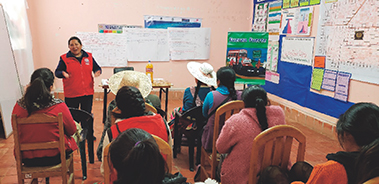
“Educational team for healthy life,” established as part of the project, providing guidance on nutrition improvement to pregnant women in target communities (Photo: JICA)
The department of Oruro is located in the highlands of the western part of Bolivia at an altitude of approximately 3,700 meters above sea level, and it is home to many indigenous people. Bolivia has the second highest maternal mortality rate*1 and under-five mortality rate*2 in Latin America and the Caribbean after Haiti, which shows the poor condition of maternal and child health.
This project was conducted to improve maternal and child health services as well as the health of pregnant women and children under five years old in Oruro department. In this project, a total of 21 experts from Japan were dispatched to three health districts in Oruro department, encompassing a total of 16 cities, to provide training and other support to healthcare workers, health administration staff, and expectant and nursing mothers. Educational activities were also conducted to raise awareness of the importance of improving lifestyle habits and other aspects related to maternal and child health.
These efforts have resulted in the improvement of maternal and child health services through community participation. For example, the project increased the percentage of prenatal care in target communities to nearly 70% and doubled the number of educational teams for healthy life that comprise local healthcare workers. In addition, the Guide for Information Analysis on Child Development was developed in the project and approved by the Ministry of Health. The Guide is utilized not only in Oruro department but also throughout Bolivia.
Japan has been cooperating with Bolivia in the field of maternal and child health for approximately 20 years and has always placed importance on providing assistance that gives careful consideration to the situation of the Government of Bolivia. Likewise, this project was carried out while placing emphasis on the concept of the multicultural healthcare system*3 that is promoted by the Government of Bolivia, in which families and communities consider their own health risks and take necessary preventive measures themselves. As a result, maternal and child health in Bolivia has been improved in a way that is in line with the culture and thought of the people in the country.
*1 206 maternal deaths according to the WHO estimate in 2015 (death rate per 100,000 births).
*2 38 under-five deaths according to the WHO estimate in 2015 (number of deaths per 1,000 births).
*3 “Different cultures have different ideas about health, and living a healthy life should be emphasized over dealing with illnesses” (see also: https://www.jica.go.jp/project/bolivia/008/outline/index.html (in Japanese only)).
- Note 24: WHO Fact Sheets 2019
- Note 25: As of 2018. The previous total was over 5.4 million children.
- Note 26: As of 2017. The previous total was over 303,000 women.
- Note 27: A mechanism to deliver products to their destination while maintaining low temperatures. This allows the quality of medical goods such as vaccines to be preserved.
- Note 28: The period after childbirth in which the woman recovers to a similar condition before pregnancy, usually around one to two months after birth.
- Note 29: Emerging diseases are infectious diseases that were not previously known and have been newly recognized in recent years, such as severe acute respiratory syndrome (SARS), avian influenza, and the Ebola virus disease. Re-emerging diseases are infectious diseases that had spread throughout the world in the past and subsequently saw a decrease in the number of cases, but have been on an increasing trend again in recent years, such as cholera and tuberculosis.
- Note 30: Pathogenic microorganisms, including bacteria and viruses, gaining resistance to antimicrobials such as antibiotics and antiviral drugs, which causes the drugs to lose sufficient efficacy.
